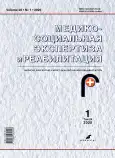Корреляция между характеристиками сфер жизнестойкости и геронтологическим профилем у пожилых пациенток
- Авторы: Кочеткова И.В.1
-
Учреждения:
- Воронежский государственный медицинский университет им. Н.Н. Бурденко
- Выпуск: Том 28, № 1 (2025)
- Страницы: 5-14
- Раздел: ОРИГИНАЛЬНОЕ ИССЛЕДОВАНИЕ
- URL: https://journal-vniispk.ru/1560-9537/article/view/316982
- DOI: https://doi.org/10.17816/MSER678909
- ID: 316982
Цитировать
Аннотация
Обоснование. Исследование посвящено изучению взаимосвязи жизнестойкости и геронтологического статуса пожилых женщин для определения прогностических факторов успешного старения. Жизнестойкость включает вовлечённость, контроль и принятие риска старения. Геронтологический статус охватывает физическое, психологическое и социальное благополучие.
Цель. Анализ результатов обследования пациенток 70 лет с учётом доменной структуры и сопутствующих заболеваний.
Материалы и методы. Исследование проводилось в отделении медицинской профилактики БУЗ ВО «Воронежская городская поликлиника № 10» с января 2017 по декабрь 2024 г., клинических базах ФГБОУ ВО «Воронежский государственный медицинский университет им. Н.Н. Бурденко». Анализировались параметры соматического статуса, локомоторной, сенсорной, когнитивной, психологической и нутритивной сфер. Использовались следующие методы: «Кардиовизор», эхокардиография, анализ вариабельности сердечного ритма, определение NLR, PLR, гликированного гемоглобина, С-реактивного белка, омега-3, шкалы FRAIL, Катца, MNA, динамометрия, биоимпедансометрия, офтальмологическое обследование, MMSE, шкала Бека и шкала астенического состояния ШАС. Данные обработаны с помощью StatTech 4.8.0.
Результаты. Высокая распространённость таких факторов риска, как недостаток физической активности (62%), гипертония (64%) и хроническая сердечная недостаточность (66%), в сочетании с тревожными показателями пресаркопении (30%) и саркопении (26%) указывает на комплексное воздействие на здоровье и функциональные возможности обследуемых. Высокий средний уровень систолического давления (175,00 мм рт. ст.), распространённость ожирения (индекс массы тела 37,10 кг/м²) и гипергликемии (глюкоза 10,60 ммоль/л) подчёркивают неотложную необходимость разработки и внедрения комплексных стратегий профилактики и лечения.
Заключение. Оценка представленных результатов позволяет установить приоритетные направления для создания индивидуализированных планов профилактики и лечения, ориентированных на уменьшение вероятности развития сердечно-сосудистых осложнений, поддержание умственных способностей и улучшение общего самочувствия изученной группы.
Ключевые слова
Полный текст
Открыть статью на сайте журналаОб авторах
Ирина Владимировна Кочеткова
Воронежский государственный медицинский университет им. Н.Н. Бурденко
Автор, ответственный за переписку.
Email: iri4217@yandex.ru
ORCID iD: 0000-0002-7546-6679
SPIN-код: 9933-5015
канд. мед. наук, доцент
Россия, 394036, г. Воронеж, ул. Студенческая, д. 10Список литературы
- Ordin GV, Salmasi JM, Mishnev OD, et al. Pathophysiology (general and clinical pathophysiology): Textbook for students of institutions of higher medical education in 2 volumes. Moscow: Medical Information Agency; 2022. 646 p. (In Russ.). EDN: XHSZPT
- Baxi M, Di Biase MA, Lyall AE, et al. Quantifying genetic and environmental influence on gray matter microstructure using diffusion MRI. Cereb Cortex. 2020;30(12):6191–6205. doi: 10.1093/cercor/bhaa174
- Cooper OAE, Taylor DJ, Crabb DP, et al. Psychological, social and everyday visual impact of diabetic macular oedema and diabetic retinopathy: a systematic review. Diabet Med. 2020;37(6):924–33. doi: 10.1111/dme.14125
- Kumar A, Gangwar R, Zargar AA, Kumar R, Sharma A. Prevalence of diabetes in India: a review of IDF Diabetes Atlas 10th edition. Curr Diabetes Rev. 2024;20(1):e130423215752. doi: 10.2174/1573399819666230413094200
- Lin K-Y, Hsih W-H, Lin Y-B, Wen C-Y, Chang T-J. Update in the epidemiology, risk factors, screening, and treatment of diabetic retinopathy. J Diabetes Investig. 2021;12:1322–1325. doi: 10.1111/jdi.13480
- Lovic D, Piperidou A, Zografou I, et al. The Growing Epidemic of Diabetes Mellitus. Curr Vasc Pharmacol. 2020;18:104–109. doi: 10.2174/1570161117666190405165911
- Saeedi P, Petersohn I, Salpea P, et al. Global and regional diabetes prevalence estimates for 2019 and projections for 2030 and 2045: results from the International Diabetes Federation Diabetes Atlas, 9(th) edition. Diabetes Res Clin Pract. 2019;157:107843. doi: 10.1016/j.diabres.2019.107843
- Taipale J, Mikhailova A, Ojamo M, et al. Low vision status and declining vision decrease Health-Related Quality of Life: Results from a nationwide 11-year follow-up study. Qual Life Res. 2019;28:3225–3236. doi: 10.1007/s11136-019-02260-3
- Riddle MC, Herman WH. The Cost of Diabetes Care — An Elephant in the Room. Diabetes Care. 2018;41:929–932. doi: 10.2337/dci18-0012
- Ilnitski A, Belousov N, Osipova O, Fesenko E. Researches in gerontology and geriatrics in the decade of healthy aging (2021–2030). Vrach. 2021;32(6):5–8. doi: 10.29296/25877305-2021-06-01 EDN: IBCNLE
- Kochetkova IV, Trofimova TG, Savelyeva GO, et al. The ratio of neutrophils to lymphocytes as a tool for assessing the risk of cardiac complications in elderly patients with type 2 diabetes mellitus. Vrach. 2024;(12):86–89. (In Russ.). doi: 10.29296/25877305-2024-12-16
- Zatsepina IV, Kochetkova IV, Fursova EA, Petrova TN. Smoking prevalence among students of medical university. Russian Journal of Preventive Medicine. 2024;27(6):29–35. doi: 10.17116/profmed20242706129 EDN: WYMQSQ
- Bykovskiy AS, Zolotykh AE, Kochetkova IV, Fursova EA, Petrova TN. The study of awareness of risk factors for the development of chronic noncommunicable diseases. Youth Innovation Bulletin. 2024;13(S1):399–402. EDN: EVQVDD
- Kochetkova IV, Fursova EA, Kravtsova AV. Use of effective professional standards for the prevention of circulatory system diseases to reduce cardiovascular risk. System analysis and management in biomedical systems. 2023;22(2):154–162. doi: 10.36622/VSTU.2023.22.2.022 EDN: VUCNRR
- Kochetkova IV, Fursova EA, Zolotareva YuA. General analysis of the results of sociological studies on the prevalence of risk factors for the development of chronic non-infectious diseases in students of the Voronezh state medical university named after N.N. Burdenko for the academic year (September 2022 — May 2023). Preventive and clinical medicine. 2023;(4):80–85. doi: 10.47843/2074-9120_2023__4_80 EDN: MYMJFL
Дополнительные файлы







